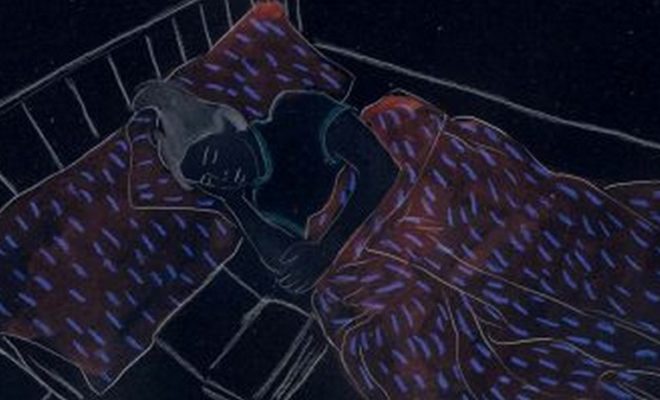
Movie Reviews
S P A C E S (M E Z E R Y)
By: Kelly Kearney
From Czech director Nora Štrbová comes an animated short film S P A C E S (M E Z E R Y) depicting the life and unimaginable loss of a person living with Giloma Hypothalamic Astrocytoma; a terminal brain tumor effecting the hypothalamus’ ability for recall and sensory recognition. The devastating diagnosis, which is often seen early on in childhood, results in a breakdown of the Autonomic Nervous System; wreaking havoc on the person’s short-term memory, eventually leading to death. Strbová documents her brother’s painful struggle of living life in the moment, only for those moments to be washed away with the receding tides of his identity.
“The more the memory fails, the closer you get to the current moment.”
The disconnect between who Simon was and who he is becoming is at the heart of this piece. It’s an impressionist’s display of an emptying brain dribbling out memories faster than the human mind can make them and it is in those frantic and fragmented lines that each scene unfolds. As the film brilliantly mimics Simon’s misfiring synapsis, his free form memories are drawn distorted and untethered to time and space. Like living inside a waking dream that flips between reality and animation, Štrbová intercuts brain scans with vivid snapshots from a more cognizant time. A simple slice of cake eaten and immediately forgotten helps to drive home the message that Simon isn’t the only one suffering in this constant state of forgetfulness. His sister, who has a front row seat to his decline, is affected, too. Pain and confusion might be the motivators behind this animated documentary short, but a sibling’s love is what shines through even the darkest moments of the film. Štrbová, who wrote, directed and animated S P A C E S uses confusing scribbles of black pencil on torn white paper to replace the face of a man who is quickly becoming a blank slate. Each scene is lonelier and more heartbreaking than the last and drawn with the same frenetic energy that is eating away at Simon’s mind.
Drawings Come to Life
The genius of this short comes from the animated technique referred to as rotoscope where scenes are filmed and then overlaid frame by frame with traced drawings. This provides a realistic action sequence that breathes life in it a two-dimensional world by humanizing it beyond pen and paper. It helps to set that disconnected mood that not only acts as a visual aid to what is happening inside Simon’s chaotic mind, but also adds an element of fear and unease working as a sort of interactive mood setter for the viewer. In each drawing you can feel the unsettling nature of loss and the pain of watching a loved one try to navigate an unfamiliar world.
There are no dull moments in this documentary, only a harrowing look at what makes up each and every one of us and how our experiences, and the memories of them, can create our whole identities. It is a glaring example of connectivity in that the absence of our past makes the present feels unfinished and the body of our life’s work unrecognizable. S P A C E S sits on the fence between brevity and an all-encompassing moment that fills you with empathy for Simon and anyone else suffering from a similar affliction. In its seven-minute time-run, the docu-short feels like a labor of love for a sister forced to watch the solitude of illness wage war on a brother’s very being. It is well worth your time to watch, witness and remember, if only to honor the people whose memories abandoned them.




You must be logged in to post a comment Login